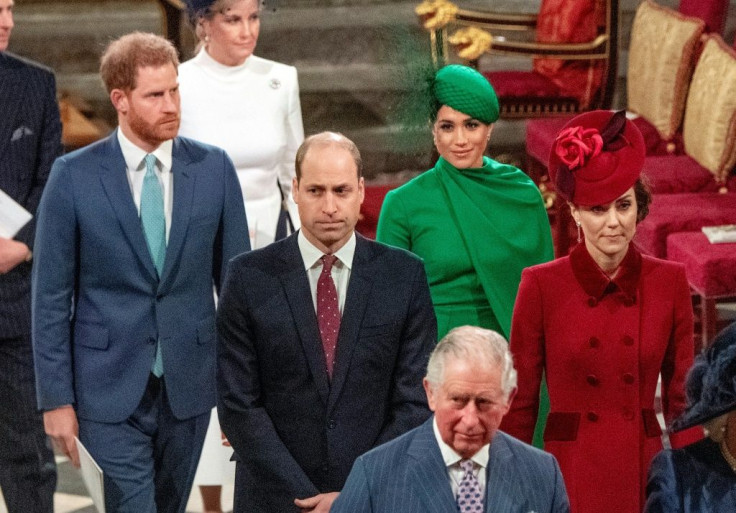BBC Journalist Apologizes After 'Rude' Comments About Prince William, Other Royals Resurface
KEY POINTS
- Amol Rajan described Prince Philip as a "racist buffoon" and Charles as "scientifically illiterate" in 2012 comment pieces
- One piece said the public roles of Prince William and wife Kate Middleton were a "total fraud"
- The BBC journalist said he deeply regrets the comments he made and looks back at them with "real embarrassment"
BBC journalist Amol Rajan has apologized after the "rude and immature" comments he made about the royal family a decade ago recently resurfaced.
Following the release of the controversial BBC documentary — hosted by Rajan — that examined the relationship between Prince William, Prince Harry and the media, it emerged that Rajan described Prince Philip as a "racist buffoon" and Prince Charles as "scientifically illiterate" in comment pieces published by newspaper The Independent in 2012, Sky News reported.
In one article, Rajan, who edited The Independent between 2013 and 2016, described Queen Elizabeth's Diamond Jubilee as "little more than the industrialization of mediocrity" and also criticized Prince William and younger brother Prince Harry as "the sort of posh nice-but-dims our democracy has struggled for centuries to remove from authority."
A second piece said the public roles of the Duke of Cambridge and his wife Kate Middleton were a "total fraud."
In a statement posted on Twitter Thursday, Rajan, 38, said he "deeply regrets" the "rude and immature" comments he had made in a "former life."
"I look back on them now with real embarrassment and ask myself what I was thinking, frankly," the BBC's media editor tweeted.
"I would like to say sorry for any offense they caused then or now. I’m completely committed to impartiality and hope our recent programs can be judged on their merits," added the host of BBC Radio 4's flagship "Today" program.
2/ … I would like to say sorry for any offence they caused then or now. I’m completely committed to impartiality and hope our recent programmes can be judged on their merits
— Amol Rajan (@amolrajan) December 2, 2021
The BBC did not comment on the controversy. But in a previous statement, it said: "Once journalists join the BBC, they leave past views at the door. Amol is an experienced BBC journalist who reports on all of the topics he covers in an impartial way and in line with the BBC's editorial guidelines," according to Sky News.
Rajan's apology received mixed responses on Twitter. Some accused him of being biased against the royal family in his recent programs, including the documentary "The Princes and the Press."
"After what was screened the other night, I definitely wouldn't call you an impartial journalist, but I gather you are only apologizing now because of the backlash that you are now receiving," one person commented.
One netizen claimed that the BBC should not have chosen him to present the documentary because the topic should have been "tackled by someone the viewers can trust to be impartial," citing Rajan's decision to let Meghan Markle's lawyer speak on the duchess' behalf without challenging her statements.
"I think you have a deep hatred against the [royal family], which doesn't make you an impartial journalist whose mission is to get to the truth. It's more likely you will use your position to undermine the monarchy," a third user claimed.
Some Twitter users backed Rajan, while others praised the journalist for acknowledging his previous comments.
"If you’re referring to comments about the royals, you really shouldn’t apologize. You’ve every right to say those things and can remain an impartial journalist," commented Republic, a British group campaigning for the monarchy to be replaced with an elected head of state.
"You are a very impressive journalist, and I really enjoyed your recent program on royalty and the media. Don't change anything," one Twitter user wrote.
"I might disagree with some of your comments, but I respect your right to say them and adding to a wider conversation not suppressing it. We all say things we regret later, and that’s part of learning and growing as an individual. If you don’t learn, something is wrong!" a third user wrote.
Rajan also became the focus of royal controversy when the royal family criticized "The Princes and the Press" last month, saying in a statement that it gave "overblown and unfounded claims" credibility.
The two-part docuseries suggested that negative stories about Markle and Prince Harry were leaked by courtiers and that there was competitiveness between the royal households.
"A free, responsible and open press is of vital importance to a healthy democracy. However, too often it is overblown and unfounded claims from unnamed sources that are presented as facts and it is disappointing when anyone, including the BBC, gives them credibility," read a rare joint statement from Buckingham Palace, Clarence House and Kensington Palace that appeared at the end of the BBC documentary.
The BBC responded to the royal family's statement, saying the documentary was "about how royal journalism is done and features a range of journalists from broadcast and the newspaper industry."

© Copyright IBTimes 2025. All rights reserved.






















